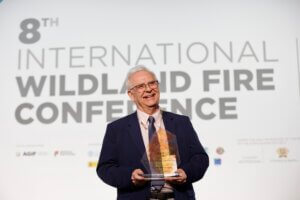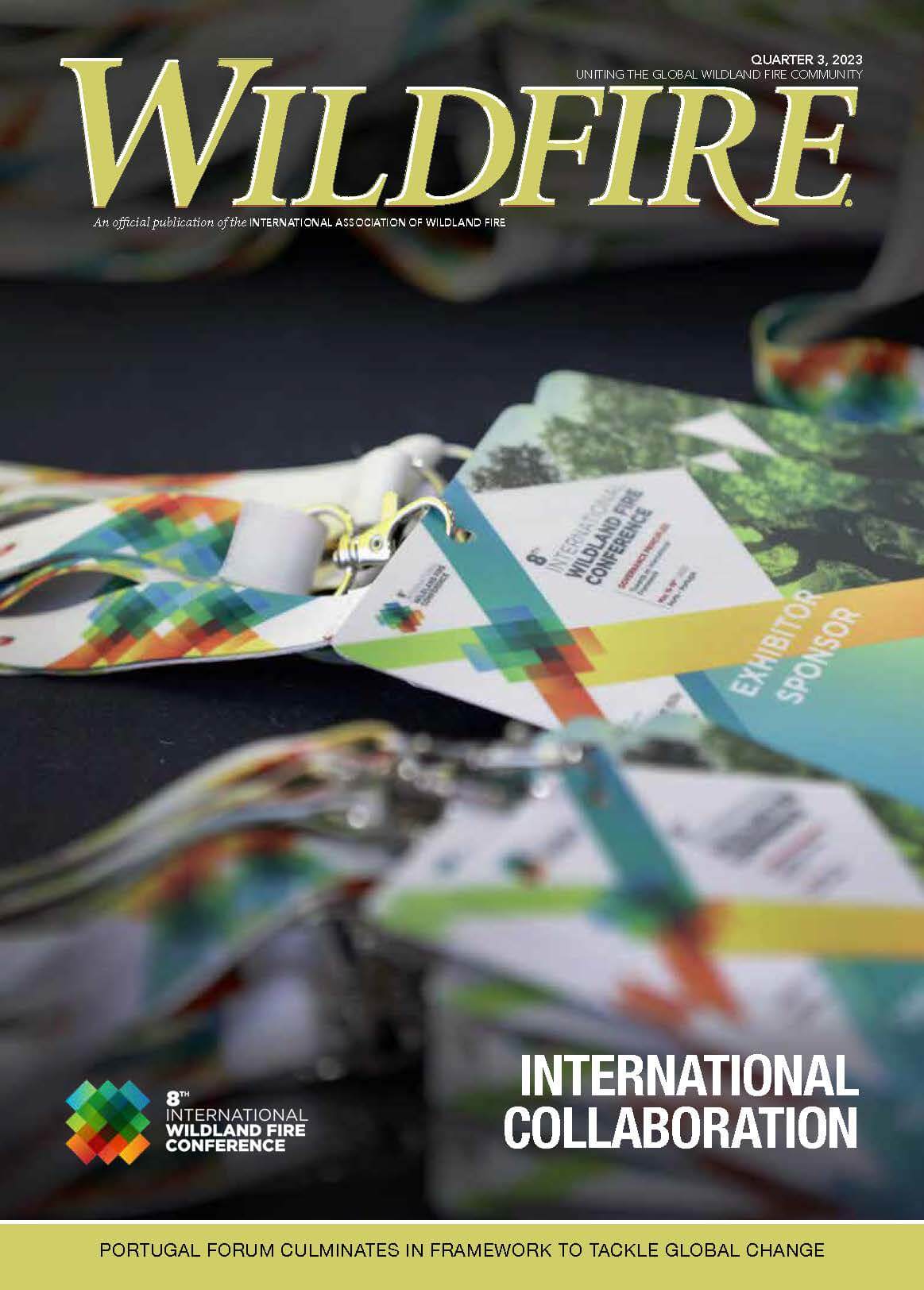IAWF AND IJWF HONOR SCIENTISTS, RESEARCHER, EDITORS
PHOTOS COURTESY OF 8TH IWFC
EMBER AWARD FOR EXCELLENCE IN FIRE SCIENCE: DAVID CALKIN
David Calkin’s contributions to the wildland fire community have markedly improved real-world decision making. Calkin’s work has served to improve the effectiveness, efficiency, and safety of the wildland fire management system. Calkin was an original codeveloper of the Wildland Fire Decision Support System (WFDSS) in the United States; this system has become the single most important wildland fire decision support system and most comprehensive record for large and complex wildfires in the United States.
Calkin developed and is the leader of the Wildfire Risk Management Science Team within the Human Dimensions Program of the Rocky Mountain Research Station. Calkin and his team have assisted in the development of Potential Operational Delineations (PODs) that better promote cross-boundary strategic pre-fire planning and next-generation fire analytics including Suppression Difficulty Index, Potential Control Locations, and Snag Hazard.
Calkin played a pivotal role in the development and application of the US Forest Service Risk Management Assistance Program, which has grown to include an online dashboard with prepositioned analytics that
 David Calkin receives the 2023 Ember Award for Excellence in Fire Science from IAWF vice-president Kelly Martin at the 8th International Wildland Fire Conference in Porto, Portugal, in May. Calkin was also named outstanding associate editor of the International Journal of Wildland Fire for 2022.
David Calkin receives the 2023 Ember Award for Excellence in Fire Science from IAWF vice-president Kelly Martin at the 8th International Wildland Fire Conference in Porto, Portugal, in May. Calkin was also named outstanding associate editor of the International Journal of Wildland Fire for 2022.
EMBER AWARD FOR EXCELLENCE IN FIRE SCIENCE: DR. JOSÉ ANTONIO VEGA
José Antonio Vega has made career-long contributions to wildland fire science through research, academic achievements, teaching, and publication in an impressive range of areas encompassing forest fire protection, forest hydrology, fire effects on soils, soil erosion, post fire soil stabilization and rehabilitation, fire ecology, prescribed fire, forest fuel reduction treatments, and forest fuel modelling.
Vega founded the Forest Fire Laboratory of the Forestry Research Center of the Xunta de Galicia in Lourizán (Pontevedra) and has managed the center and coordinated the Fire Research Group for 25 years.
Vega was an associate professor at the University of Vigo, teaching fire science, for more than 21 years.
Vega has been an officer of the International Union of Forest Research Organizations and co-ordinator of the Group of Forest Fires of the Spanish Society of Forest Science. Vega has served as a guest lecturer, visiting professor, and visiting scientist at numerous universities, institutes, training centers, and research centers throughout Europe, South America and the United States.
Vega has an exemplary publication record, having written more than 300 publications. Vega is a wellrespected leader and an admired role model in fire science and has been recognized with awards in Spain and the United States.
Vega’s long-term commitments and achievements to the advancement of wildland fire science excellence truly personify the spirit of the Ember Award.

FIREBREAK AWARD FOR EXCELLENCE IN WILDFIRE MANAGEMENT: JAN KACZMAROWSKI
After graduating in forestry at the Warsaw University of Life Sciences, Jan Kaczmarowski has had a distinguished career in forest fire protection, and he continues to lead and inspire others.
Kaczmarowski’s accomplishments include developing a national system of fire protection procedures and infrastructure, leading climate change adaptation in forestry, and representing Poland on international bodies.
Kaczmarowski shares his knowledge with others through teaching and supervising post-graduate students and is a regular contributor to forestry and fire management publications.
With a strong interest in science and research as well as a national leadership role, Kaczmarowski is also active in the field; he conducts inspections and investigations, organizes wildfire training, is involved in the management of large fires, and is a strong advocate for prescribed fire.
As a program manager, Kaczmarowski demonstrates excellence across many aspects of fire, from ecology to operations.
Beyond Poland, Kaczmarowski’s expertise in fire management and training has taken him to Cypress, Lebanon and Moldova in a voluntary capacity.
Kaczmarowski is a link between foresters and firefighters, scientists and practitioners, in Poland and abroad.
 Jan Kaczmarowski received the Firebreak Award for Excellence in Wildfire Management at the 8th International Wildland Fire Confernce in Porto, Portugal, in May. Among his accomplishments, Kaczmarowski devloped a national system of fire protection procedures and infrastructure.
Jan Kaczmarowski received the Firebreak Award for Excellence in Wildfire Management at the 8th International Wildland Fire Confernce in Porto, Portugal, in May. Among his accomplishments, Kaczmarowski devloped a national system of fire protection procedures and infrastructure.
EARLY CAREER AWARD IN FIRE SCIENCE: DR. MICHAEL GOLLNER
Michael Gollner works at the intersection of wildland fire, combustion, and fire protection engineering.
Gollner is a very active and innovative researcher with a grand vision of the crucial issues in the field of fire science. Gollner has made significant contributions to the understanding of the general problem of ignition and fire spread, heat transfer mechanisms in spreading fires and from burning ember piles to structural components, ember generation, and the link between fuel moisture and emissions.
Among Gollner’s many activities and committee positions with professional organizations, he served two terms as an IAWF board member and former treasurer, working to draw engineers and physical scientists closer to the wildland fire community.
Gollner’s expertise is widely acknowledged; he has testified to the US Congress on wildland fire policy, and has given several keynote lectures at technical meetings and many invited talks.
Gollner has received awards from the International Association of Fire Safety Science and the Combustion Institute, demonstrating how he excels at the interface between applied fire research and fundamental combustion research.
As an educator, Gollner has excelled, teaching a large variety of courses, and mentoring many young fire protection engineers and fire safety scientists.

Michael Gollner is the recipient of the Early Career Award in Fire Science for his work on the understanding of ignition and fire spread.
EARLY CAREER AWARD IN FIRE OPERATIONS: FÁBIO DA SILVA
Fábio Miguel Martins da Silva began fire fighting when he was 18 as an urban firefighter. At age 21, he began working with Portugal’s helitransported brigades and has been part of the Special Force for Civil Protection since 2007. Da Silva now holds the third highest command position in the national structure where he serves as the operational co-ordinator, as well as the leader of the Fire Analysis and Use Group.
This taskforce, comprising 28 firefighters and analysts and led by da Silva, has made a significant contribution to improving Portugal’s capacity to respond to wildland fires.
Da Silva led the development of the FEB Monitoring GIS system currently in use, which supports operational decisions; he is also committed to education and training.
Da Silva is a professor at the Nova University Lisbon for postgraduate courses, as well as an instructor at the National School of Fire Fighters of Portugal (Escola Nacional de Bombeiros).
In addition to sharing his experience and work at national and international conferences, da Silva is an expert from the Commission’s Civil Protection Mechanism, and serves on the advisory board of the Pau Costa Foundation.

IJWF OUTSTANDING EDITOR AWARDS
The International Journal of Wildland Fire has named two recipients of the 2022 outstanding associate editor award.
Dr. David Calkin and Dr. Hayley Hesseln are on the IWFJ editorial board.
“The reputation and performance of a journal’s editorial board is vital in maintaining the quality and continually improving the stature and visibility of that journal,” IAWF said in May.
Calkin (pictured on page 8) is a supervisory research forester at the Human Dimensions Program of the US Forest Service Rocky Mountain Research Station in Missoula, Montana. He co-leads the Wildfire Risk Management Science team working to improve riskbased fire management decision making through improved science development, application, and delivery. His research incorporates economics with risk and decision sciences to explore ways to evaluate and improve the efficiency and effectiveness of wildfire management programs.
Calkin received a BS in applied math from the University of Virginia, an MS in natural resources conservation from the University of Montana, and his PhD in economics from Oregon State University.
Hesseln is an associate professor in the College of Agriculture and Bioresources and the head of the Department of Agricultural and Resource Economics at the University of Saskatchewan. She teaches resource and environmental economics and has conducted research on the economics of forestry and forest fires, environmental and resource economics, and workforce development in the north. She has done research on the economics of wildfire and fuels management including an examination of the costs of fuels treatments such as prescribed burning and mechanical fuels reduction. In addition, Hesseln has explored the impacts of wildfire in the wildland urban interface, wildland fire policy, and the effects GIS on suppression expenditures. Current research interests include effective pedagogical approaches to learning, and the effects of emotional intelligence in the workforce.
Calkin and Hesseln have been associate editors of the IJWF since 2015 and 2009 respectively, and Calkin has been a member of the IAWF since 2005.

IAWF SCHOLARSHIP RECIPIENTS FOCUS ON ECOSYSTEM
Elise Brown-Dussalt is an masters of science student in integrative biology at Wilfred Laurier University in Ontario. Brown-Dussalt was introduced to boreal burns in 2019, when she took her first field job assisting a master’s student on the Chilcotin Plateau in Central British Columbia. After her first soot-coated summer, she found her interests continuing to gravitate towards boreal wildfires and forest dynamics. As a resident of Canada’s Yukon territory, Brown-Bussalt sees first-hand the complex socioenvironmental effects of wildfire in the north. She started a master’s with the Forest Ecology Research Group at Wilfrid Laurier University in Ontario in 2022, hoping to contribute to climate change resilience in the northern boreal. Her research looks at caribou lichen transplantation as a method of accelerating caribou winter habitat regeneration, specifically seeking ideal transplant conditions for caribou lichen in boreal burns. Brown-Dussalt conducts research on the lands of Ka’a’gee Tu, Deh Gah Got’ie First Nations, and Tłı chǫ nation in the Northwest Territories.

Stella Mosher is a PhD candidate in the department of geography at the University of Utah. Mosher received her bachelor of science in natural sciences, with an emphasis in geology from the University of Puget Sound, and her masters of science in geology from the University of Cincinnati, before choosing to pursue paleoecology and paleofire research for her PhD. Mosher has a deep interest in understanding how climate and people have modified Earth systems, and specifically how changes in fire activity have shaped (and continue to shape) our landscapes and communities. Mosher’s research is focused on reconstructing fire histories over millennia in South Africa’s highly biodiverse and fireadapted fynbos biome; she is particularly interested in understanding how this ecosystem has evolved due to climate and anthropogenic changes, including the onset of pastoralism in the fynbos ~2,000 years ago, and subsequent landscape transformations through fire suppression since ~1650 CE. Mosher is reconstructing fire histories at ~two-year intervals over the past 4,200 years to better understand these climate-vegetation-firehuman linkages and hopes that her research will provide a paleo-ecological context for understanding how climate and people have influenced fire in the fynbos.

